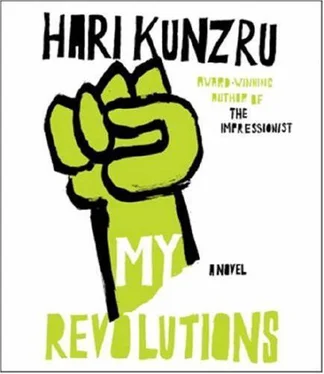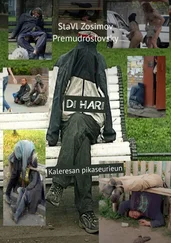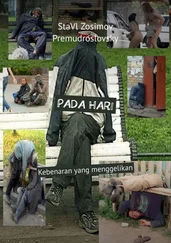to pay. “Would you like to add an extra shot or a flavor for only fifty p?”
We sat in the window. Miles performed his usual fussy sitting-down routine, fiddling with his trouser legs and smoothing his jacket under his bottom. For a while he rambled on about his chiropractor. Miracle worker, reasonable rates. Another carry-over from the old days. Miles always had an air of slight distraction, a vagueness that made it hard to tell where his attention was directed.
“I’m sorry, Chris,” he said eventually, with the compassionate expression of a doctor about to tell the patient his cancer had metastasized.
“What exactly are you sorry about?”
“In life, I always say, you start off somewhere and you end up somewhere, but the trouble is you don’t begin with a clean slate. I think that’s what we were after. A clean slate. Not much to ask, you would have thought. Take me, for instance. I realize everyone thought I had it very easy. Well, I didn’t. My life wasn’t simple at all.”
“Is that so?”
“You sound skeptical.”
“You seemed to be able to do what you wanted. You drifted around, made your films. You always had money.”
“Money wasn’t really the issue.” He leaned back in his chair and stretched. I heard the joints in his arms and back make an unpleasant gristly sound. “I was doing my best to look free. It was the fashion, wasn’t it? You had to look free. And sincere! You had to be so crushingly sincere all the time! God help you if you weren’t. Everyone jumped down your throat.”
“What do you want, Miles? I need to get back.”
He ignored me, fixated on his train of thought. “I’ve given it a lot of input over the years and now I understand why everyone was so bloody boring. I think deep down we all knew we were doomed to be terribly disappointed, but we hated anyone bringing it up. If you brought it up, it messed with everyone’s vibe.”
“Who’s this ‘we’ you keep talking about? I hardly knew you.”
“Do you remember the time we met in Wales?”
“Yes.”
“You were in too deep, by then. I could tell you were.”
That was true enough. I’d started to get eczema on my eyelids and on the backs of my hands. Whole days went by when I couldn’t get out of bed. At other times I was possessed by an intense, restless energy. From the flat in Camden Town, I started to take long walks by the canal, picking my way along the towpath toward the rubble of the docklands, or into the West End, where I’d wander around staring at the bustling world as if it were behind glass, an expensive window display arranged for someone else’s benefit, not mine.
After I got back from the training camp, I couldn’t see what the future held. I felt like I’d cut myself off from everything meaningful. Other groups were continuing the political work we’d once done; they were still connected to the struggle, to something wider than themselves. Once I’d been surrounded by people. Where had they all gone?
One afternoon, as I was bustling purposelessly toward Camden Lock, someone called out to me. I didn’t respond at first, but finally, after my name was shouted a second and a third time, I turned round and saw a girl I knew from Free Pictures. Alison had curly dark hair and a broad, gentle smile; I hadn’t seen her since the last chaotic party at Lansdowne Road, during which, for an hour or two, I’d hoped we might go home together. She greeted me with a hug and asked what I’d been doing. I gave some noncommittal answer. She seemed almost absurdly excited and carefree, as if she were the inhabitant of a parallel world where young people were allowed to drift around on September afternoons without worrying about raids and explosives and surveillance and the secret state. She was living nearby. And me? “Round about,” I said. “Staying with friends.” Why hadn’t she seen me? I shrugged. She gave me an appraising look. Then, as if struck by a sudden inspiration, she asked if I wanted to go to Wales with her and her friends. Right then, that afternoon. There was a free festival. There was space in the van.
I said yes instinctively, without thinking.
As I was driven out of London in someone’s beaten-up Bedford, I started to think of all the reasons I shouldn’t be going. The breach of security; the breach of discipline. But no one else had been in the flat where I was staying so there’d been no one to question me.
There were six of us. Though the others were all my age, they seemed incredibly young. The boys showed off, telling jokes and trying to impress each other. The girls giggled and rolled their eyes at Alison, who let them know I was her property, nestling herself beside me in the back and chattering away about things that seemed utterly foreign: the names of bands, the hassles of her part-time job.
By the time we reached the Welsh borders, a light rain had set in and the atmosphere in the van became more subdued. At last, after many hours’ driving, we found ourselves crawling through tiny lanes in a remote spot on the Caernarfonshire coast, looking for the festival site. We found it by following a London taxi painted with Day-Glo orange and yellow swirls, which led us to a muddy patch of farmland by a river, set in a beautiful bowl of forested hills. The festival wasn’t a huge event. The organizers had erected a small stage and a few hundred people had set up camp on the soggy land around it, a scattering of tents and trucks and tepees that looked like some sort of tribal encampment.
Ragged people moved through the forest foraging for firewood. Some had built shelters among the trees out of tarpaulins and artfully interwoven branches. As we pitched tents there was a moment of awkwardness until Alison made it clear I’d be staying with her. We went over to hear some music, stretching out on a rug listening to a group featuring a flautist who traded licks with a sitar, while their singer rhymed getting straight with meditate.
Lying down beside Alison, I let the sound wash over me. A jazz-rock band came on, all complicated riffage and polyrhythms. A gnomelike old guy, naked except for a loincloth, performed a shuffling shamanic hop at the front of the stage. Alison and I talked,
or rather she talked and I listened, happy to hear her opinions about books and fashion and films. A kitchen was dispensing free food and as we lined up with our bowls I had to fight the urge to cry on her shoulder, to let all my troubles spill out. As night fell, people lit bonfires and someone passed round a tube of tiny red stars. As Alison came up on her trip she wanted to have sex but I couldn’t and felt bad about it, which made her feel bad too. We stopped trusting each other and she retreated to her friends and eventually I left the circle of firelight and wandered around in the dark. Someone was playing a repetitive figure on an electric guitar, a jagged rasp that seemed vaguely threatening, like the shadows that loomed up around me as I stumbled through the damp woods, shadows that always resolved into the silhouettes of other festival-goers, lost souls too high and disoriented to get back to their friends. I fell asleep by someone else’s fire and woke up very early in the morning to the sound of conversation.
For a long time I didn’t move. I couldn’t feel my arms and legs. In my confusion I wondered if I’d died. The light was very bright. A young girl with a disturbingly doll-like face was reaching down toward me, touching my face. Her blue eyes and white clothing triggered some Sunday-school routine in my brain: it was only when I noticed the muddy hem of her dress that I was finally convinced she was real.
“You’re very cold,” she said, in a broad Yorkshire accent. I sat up stiffly, rubbing my eyes. She was right. My back had frozen into a painful block. She offered me a joint, which I waved away. Then, to my amazement, I noticed Miles Bridgeman sitting next to her, wrapped in a shaggy Afghan coat. His hair had grown and he had a full beard, plaited into twin strands held together by little glass beads.
Читать дальше












